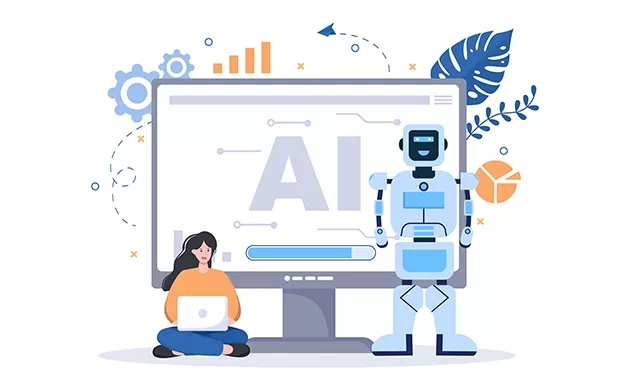Web developers are using artificial intelligence (AI) to improve user experiences, expedite website maintenance, and enhance different parts of the web development process. The following are a few ways that AI is used in Artificial intelligence for Website Development.
Automated Creation of Content:
Articles, product descriptions, and even code documentation can be produced for websites by AI-driven systems.
AI that uses natural language generation (NLG) can produce relevant, exciting writing that sounds human.
Virtual assistants and chatbots:
AI-driven chatbots increase user engagement, offer real-time customer service, and respond to often-requested inquiries.
Virtual assistants improve the user experience by allowing voice commands for content access and website navigation, similar to AI-driven speech-activated interfaces.
Customization:
To provide tailored content and product recommendations, artificial intelligence (AI) systems examine user behavior’s, preferences, and previous data.
Customization raises conversion rates and improves user engagement.
Analytics that predict:
Predictive analytics powered by AI facilitates data-driven decision-making for web development by forecasting user behavior’s, traffic trends, and content popularity, among other things.
Layout and content can be improved with the use of this information.
Optimization of Search Engines (SEO):
AI tools can evaluate the performance of websites, pinpoint areas in need of development, and provide SEO optimizations.
Tools for keyword analysis and study driven by AI help raise a website’s rating.
Design and Layout of Websites:
AI can help with web layout design and optimization to improve the user experience.
AI is used by programs like Adobe Sensei to recommend fonts, colour schemes, and design elements.
Conversion rate optimization with A/B testing:
AI algorithms can perform A/B testing on various website features and layouts to ascertain which versions result in higher conversion rates.
This aids in improving user engagement on the website through optimization.
Debugging and Testing Automated:
By locating and resolving coding errors, AI can automate the testing process and guarantee the functioning and performance of the website.
It lowers the possibility of mistakes and saves time.
NLP, or natural language processing,
Sentiment analysis, content classification, and chatbot interactions all make use of NLP.
It makes it possible to comprehend comments and information created by users.
Safety and Preventing Fraud:
Artificial intelligence assists in detecting and stopping online fraud and security risks, like fraudulent transactions or malevolent login attempts.
Video and Image Processing:
AI systems are capable of analyzing and optimizing photos and videos to enhance the user experience and speed up loading times.
Image identification Images can be tagged and categorized by AI to simplify content management.
Systems of Recommendations:
AI recommendation systems make recommendations for goods, articles, or other content based on an analysis of user behaviour and preferences.
These systems are applicable to content websites, e-commerce, and other domains.
Tagging and Content Management:
Content can be automatically tagged and categorized by AI, simplifying management and search.
It is helpful for sorting through a lot of stuff.
Performance Enhancement:
Website performance can be analyzed by AI-driven technologies, which can also recommend optimizations for quicker loading times and better responsiveness.
Voice Recognition and Voice Search:
Voice search features and enhanced voice recognition for voice-activated web interfaces are implemented with AI.
Data insights and analytics:
Large data sets can be processed by AI, which can also provide patterns, trends, and insights into user behaviour.
Making educated decisions is facilitated by these insights.
Inclusivity and Accessibility:
By offering tools like text-to-speech, voice commands, and screen readers, artificial intelligence (AI) can be utilized to improve the accessibility of websites for individuals with impairments.
AI integration into web construction can significantly enhance a website’s effectiveness, user experience, and security. Web developers must keep up with the latest developments in AI and think about how AI might help their particular projects.



